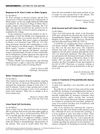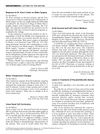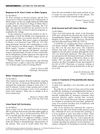Search
for
Sort by
Research
30-60 / 875 results
research Male Androgenetic Alopecia
Male androgenetic alopecia (MAA) is a common, hereditary hair loss condition in men, linked to heart disease, and can be treated with minoxidil, finasteride, or hair transplantation.

research Polycystic Ovary Syndrome and Cardiovascular Disease: A Premature Association?
While PCOS might increase the risk of heart disease, there's not strong evidence to prove it causes earlier heart problems.

research Pseudoacromegaly Induced by the Long-Term Use of Minoxidil
Long-term minoxidil use can cause pseudoacromegaly, but stopping it improves symptoms.

research Endocrinological Evaluation and Hormonal Therapy for Women with Difficult Acne
Hormonal therapy is a good option for women with severe acne, especially when there's a chance of hormone imbalance.

research Nonscarring Alopecias: Overview and Treatment
The document concludes that proper diagnosis and treatment of nonscarring alopecias can improve quality of life and hair regrowth is possible as the hair follicle remains intact.

research Diagnosis and Treatment of Polycystic Ovary Syndrome: An Endocrine Society Clinical Practice Guideline
The guideline suggests using specific criteria to diagnose PCOS, recommends various treatments for its symptoms, and advises screening for related health issues.

research Bioavailability of Albumin-Bound Testosterone
Spironolactone treatment increases the amount of testosterone available in the body.

research Cutaneous Androgen Metabolism: Basic Research And Clinical Perspectives
Creating stronger blockers for skin enzymes might lead to better treatment for conditions like acne and excessive hair growth.

research A Multicenter, Randomized, Placebo-Controlled, Double-Blind Clinical Trial of a Novel Formulation of 5% Minoxidil Topical Foam Versus Placebo in the Treatment of Androgenetic Alopecia in Men
New 5% minoxidil foam effectively promotes hair growth and is safe for use.

research Immunohistochemical Localization of Types 1 and 2 5α-Reductase in Human Scalp
The study found that two enzymes linked to hair loss are located in different parts of the scalp, supporting a common treatment's effectiveness.

research Gene-Wide Association Study Between the Aromatase Gene (CYP19A1) and Female Pattern Hair Loss
Aromatase gene variation may increase female hair loss risk.

research Oxidative Activity of the Type 2 Isozyme of 17β-Hydroxysteroid Dehydrogenase Predominates in Human Sebaceous Glands
The enzyme 17β-HSD type 2 mainly performs oxidation in human sebaceous glands, which may help protect against acne.

research No Evidence That 2D:4D Is Related to the Number of CAG Repeats in the Androgen Receptor Gene
Finger length ratios are not linked to the number of specific gene repeats affecting testosterone sensitivity.

research Surrogate End-Points or Primary Outcomes in Clinical Trials in Women with Polycystic Ovary Syndrome?
The document suggests that clinical trials for PCOS should focus on meaningful primary outcomes like live birth rates, rather than less reliable surrogate markers.

research Pharmacologic Modulation of Sebaceous Gland Activity: Mechanisms and Clinical Applications
The document concludes that new treatments are needed to better manage acne and reduce side effects related to current therapies.

research Contraceptive Use in Acne
Hormonal contraceptives can help treat acne by affecting sebum production and androgen levels.

research A Case of Inflammatory Nonscarring Alopecia Associated With the Tyrosine Kinase Inhibitor Nilotinib
A cancer drug called nilotinib might cause hair loss due to inflammation around hair follicles.

research Diagnosis and Management of Infertility in Women With Polycystic Ovary Syndrome
Women with PCOS-related infertility can often conceive with treatments like clomiphene and metformin, but managing pregnancy complications is important.

research Activity of Type 1 5α-Reductase Is Greater in the Follicular Infrainfundibulum Compared with the Epidermis
The enzyme type 1 5α-reductase is more active in the hair follicle's lower part than in the skin's outer layer.

research Clinical Review 74: Dermatological Manifestations of Endocrine Disorders
Skin changes can indicate hormonal imbalances and help diagnose endocrine disorders.

research Lasers in the Treatment of Pseudofolliculitis Barbae
Lasers can effectively treat pseudofolliculitis barbae, but insurance often doesn't cover it, possibly due to racial bias.

research Hyperandrogenism in a Postmenopausal Woman Secondary to Testosterone-Secreting Ovarian Stromal Tumor with Acoustic Schwannoma
A 63-year-old woman's male-like symptoms were caused by a rare testosterone-producing ovarian tumor, treated by removing her ovaries and fallopian tubes.

research Linear Basal Cell Carcinomas
Dr. Connelly agrees that linear basal cell carcinomas might be more aggressive but highlights the study's lack of clear criteria to identify them.

research Using the Web as a Resource on Hair Loss
The article says Rogaine and Propecia can treat hair loss, warns about unreliable internet info, and advises talking to a doctor before using hair loss products.

research 5-Alpha Reductase Inhibitors: New Evidence on Benefits and Harms Beyond Benign Prostatic Hyperplasia
5-alpha reductase inhibitors may have additional effects on cancer, mental health, heart health, and hormone levels beyond treating prostate enlargement.

research Abstract 151
Activating TLR3 helps improve skin and hair follicle regeneration after wounds.

research Abstract 152
TLR3 activation helps improve skin and hair follicle healing in mice.

research Response to Dr. Korc’s Letter on Mohs Surgery
Dr. Zitelli emphasized that "Mohs surgery" should only be called that when one doctor does both the surgery and pathology.

research Graft Survival and Cell Culture Medium
The cell culture medium "RPMI" might slightly improve hair graft survival, but not by a significant amount.